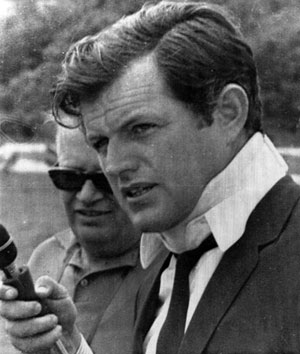Remembrance of Things Past

The Kennedy crime family seems to have been the first to come up with the bright idea to import its ill-gotten (remember patriarch Joe was, among other things, a bootlegger) gains into legitimate and semi-legitimate (movies and later, politics) businesses. Thus, the crimes associated with the Kennedys' wealth have, for the most part, been forgotten or swept aside, and the American polity if not history has been saddled with (lovers of fairy tales may take exception) the Camelot mythology. Countless words have been expended about the Kennedys--too many by anyone ever (even tangentially) associated with the family and the history--butlers, chauffeurs, secretaries, bag men, court historians, and on and on--and scholarship is clotted with a Himalayan range of (what is loosely construed as) information. Ted Kennedy's recent death, while serving as some kind of indicator of his role in history (of course the convention of not speaking ill of the dead was in play) was followed shortly by the publication of his memoir True Compass (Twelve), aptly for an avid sailor, a sailing term. On the book's web site there is an interrogatory with Kennedy that aptly poses the appropriate softballs, the first being:
Q.
A.
And the last:
Q.
A.
Which certainly, serving as a United States Senator through 10 presidents and authoring approximately 2,500 major bills--at least 300 of which have become law--he did.
Whatever else we can say and know about Edward Kennedy, the so-called Chappaquiddick incident--in which Mary Jo Kopechne died in a car Kennedy was driving--cast a large shadow on his life and career, and no doubt cost him a shot at the U.S. presidency.
Joyce Carol Oates's 1992 novella Black Water (Dutton) fictionalizes the story, perhaps as an homage to Kopechne--who becomes a footnote--making her loss vivid and poignant.
New York Times reporter Robert Sherrill's entertaining 1976 book The Last Kennedy (The Dial Press), about Kennedy before and after Chappaquiddick, takes an interesting path. He asserts it was intended to...
present a case study of how a famous politician--by delays, by obfuscation, by propaganda, by all sorts of tricks and wiles--can kill somebody under mysterious circumstances and still regularly receive more than 40 per cent of the support in presidential polls. That's about as close to a miracle as we are likely to come in these pagan days.
